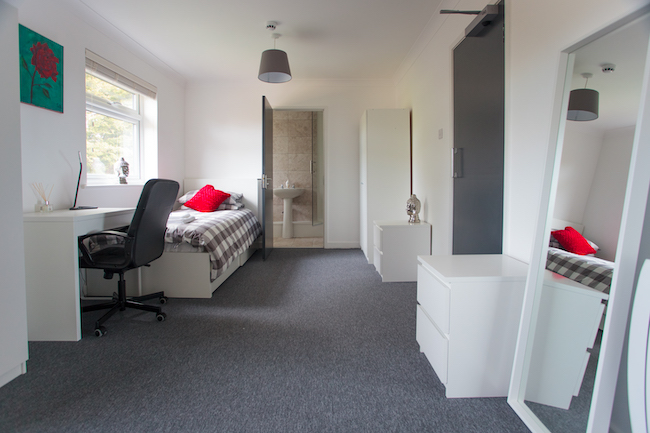When working out which is the right drug and alcohol clinic for you or a loved one, you’ll have a lot of things to consider. Location is important, of course, as is the cost and the urgency of your situation. However, one area that we’ve found to generate the most concern is the idea of sharing a room with a stranger.
Addiction is not a sociable affliction. It can often start that way, but it rarely stays a social activity. Isolation is far more common and much more likely. The addicted person’s priorities change, and they become more focused on obtaining and using the substance of their addiction, to the detriment of everything else in their life, including family, friends, and hobbies. So the idea of a shared room can be off-putting.
If you’re considering drug or alcohol rehab, you’ll have to decide whether to share a room with someone or have your own space. While both options have pros and cons, shared rooms often come with some significant advantages. Here’s why sharing a room in rehab can be a great idea for many people.
The Fear of Room Sharing in Rehab
Addiction is a progressive disease, meaning it typically gets worse over time. As it progresses, the addict may withdraw from society completely to fuel their addiction. So the thought of sharing a room raises immediate concerns, of course. We’ve found that the most common concerns about sharing a room in rehab include:
- Lack of privacy
- Fears of roommate incompatibility (will they be messy or violent?)
- Not having enough space.
These are all understandable concerns. However, the many advantages of a shared room in drug and alcohol rehab centres are often overlooked.
The Struggle of Rehabilitation
The first step in the rehabilitation process is typically detoxification, which can be an incredibly difficult and uncomfortable experience. But it is vital for clearing the body of harmful substances and preparing for the next stage of treatment. After detox, patients will begin to address the underlying issues that led to their addiction. This can be a challenging and emotional process, but it is essential for lasting recovery.
Drug and alcohol addiction are complex problems that often require intensive treatment to overcome. Rehabilitation for drug and alcohol addiction can be incredibly intense, as the individual will be dealing with long-term issues negatively affecting their life. The person going through the treatment process will do so throughout the day and need to be committed to their recovery to succeed.
The Importance of Being Social
The benefits of social interactions while undergoing drug rehab simply cannot be understated. When you’re learning to deal with anxiety and panic attacks during rehab, having a roommate can be extremely beneficial. While you may be wary of sharing a room with a stranger, the fact is that they often become the best person to confide in. After all, although their life experiences are likely very different, they will be going through the same thing as you.
Many people don’t realise that the fellow patients you meet in drug rehab or alcohol rehab centres can often be the most valuable form of support. While the staff at these facilities are trained to help you through your recovery, they can only do so much. It is often the people who have been through the same thing as you that can provide the most motivation and guidance.
Shared Support
These are the people who understand what you’re going through and can offer first-hand advice on how to overcome your addiction. For this reason, it is important to view drug and alcohol rehab not as a solo journey but as a shared experience. When you open yourself up to the support of others, you will find that the complex journey to recovery becomes much easier to navigate.
The road to recovery from drug or alcohol addiction is often a long and difficult one. People trying to break free of their addiction often face many challenges and need all the support they can get. That support will be vital to achieving the best results from the recovery process.
Additional Support
The physical, emotional, and psychological damage that addiction causes can be profound, and the journey back to health is often difficult. However, with the right support, people in recovery can achieve lasting sobriety and build a new life for themselves. That’s where the person you share a room with will add to the support you get from the rehab team.
While you will receive professional help and guidance from the staff at the rehab centre, your roommate can provide a unique form of support. They will be someone who understands what you are going through and can offer empathy and encouragement. Your roommate can play an essential role in your recovery journey.
During rehabilitation, you will often face challenges and setbacks. Having a roommate who can be a source of moral support, encouragement, understanding, and motivation during this time is invaluable. A roommate can help you stay focused on your recovery goals and provide a listening ear when you need to vent about the frustrations of the rehabilitation process.
Help with Personal Growth
When we can take the time to build relationships with other people who have experienced the same kinds of struggles we have, it benefits both our personal growth and our ability to overcome addiction. Learning first-hand that others have similar lived experiences highlights that we aren’t alone — and that addiction can affect anyone.
This shared experience in such an emotional setting as a rehab clinic can quickly reveal insights into our personal difficulties, suggesting a more human element to our experiences. That leads to us becoming much more forgiving of ourselves, which is one of the biggest strides you’ll make in the recovery process.
The Additional Benefits of a Shared Room In Rehab
Anyone considering rehab should know about the many benefits of a shared room. In addition to providing social support, sharing a room can also lead to better morale and faster healing. Here are four more advantages of living in a shared space during rehab.
Minimising Isolation
Drug and alcohol rehab centres typically have shared rooms to help patients feel less isolated and more supported throughout their journey. It can be hard to commit to rehab: the prospect of spending time in a strange place away from home and your support systems can be daunting.
However, it’s important to remember that you’re not alone in this. There are other people in the same situation as you, which is why shared rooms are such an important part of rehab. Connecting with others who are going through the same thing can make a big difference, and it can help prevent relapse. Isolation is one of the main risk factors for relapse, so shared rooms can play a vital role in helping people stay on track with their recovery.
Accountability
Shared rooms in drug and alcohol rehab centres can maximise accountability and decrease the potential for relapse. When a resident has a roommate, they will have someone else to answer to. As a result, they will find it much more difficult to engage in secretive and destructive behaviours.
Accountability is an integral part of the recovery process. It helps residents take responsibility for their actions and learn how to live a drug and alcohol-free life. In addition, shared rooms can provide an opportunity for residents to bond with one another and build supportive relationships that can last long after they leave rehab. These relationships can be crucial for maintaining sobriety in the long term.
A Sense of Community
Shared rooms in drug and alcohol rehabilitation centres encourage a sense of community among residents and help to build relationships that provide support, hope, and friendship. These social networks can play a crucial role in recovery, often giving a sense of belonging and improving recovery outcomes.
Shared rooms also offer the opportunity for residents to learn from each other and gain valuable insights into the recovery process. In addition, shared rooms foster a spirit of cooperation and caring, which can be an important factor in the success of any drug or alcohol rehabilitation programme.
Having Company
A shared room in drug rehab can provide much-needed company and support during what is often a very isolating and difficult time. While it’s necessary to have some time to yourself during recovery, too much isolation can lead to boredom, loneliness and depression, increasing the temptation to start using again.
A shared room can help to prevent this by providing a space for socialisation and connection. In addition, being around other people who are also in recovery can be a source of inspiration and motivation. It can remind you that you’re not alone in your struggle and that others understand what you’re going through.
The Shared Growth Experience
A shared room in rehab means you can learn from each other. The people in recovery will come from very different backgrounds, but their shared experiences mean they likely have a lot in common. Spending time with other people can help ease your pain and inner suffering.
By doing so, you will be allowing yourself an environment conducive to laughter and healing. By sharing stories, patients can provide hope and encouragement to others who may be struggling with similar issues. Lastly, it creates an opportunity for patients to learn about different coping mechanisms, how to best deal with triggers, and coping with alcohol cravings in recovery.
Overall, a shared room in rehab provides many benefits and should be considered when choosing a treatment facility.
Tips on Room Sharing during Rehab
Here are a few things you can do to make your time in rehab more comfortable for yourself and the person sharing a room with you.
1. Respect their Experiences
It is important to respect your roommate’s experiences. Addiction is a very personal struggle, and everyone deals with it in their own way. Remember that your roommate is going through a difficult time, and try to be understanding and supportive.
2. View Room Sharing as an Opportunity
Having a roommate in rehab is an opportunity to learn. It’s understandable to feel anxious about this, but try to see it as an opportunity rather than a punishment. Room sharing during rehab can be a great way to learn more about yourself and build relationships with others who are going through the same thing.
3. Consider the Shared Space
People can bring a lot of stuff with them to rehab, and you don’t want to feel cramped or like your things are in the way. Talk to your roommate about how much space they need and make sure that everyone is comfortable with the arrangement. Room sharing can be a great experience, but it’s important to be mindful of everyone’s needs.
4. Establish Boundaries
If you are sharing a room during drug or alcohol rehab, it is crucial to establish boundaries with your roommate, which will help create a respectful and supportive environment for both of you. Some things to consider include: how much personal space you need, what times of day you need alone time, and what topics are off-limits for discussion.
5. Get To Know Each Other
Rehab can be a difficult and emotional time for everyone involved. If you’re going to be sharing a room with someone during treatment, you should take the time to get to know each other.
This can help make the experience more bearable and may even help your recovery. Staying sober after alcohol rehab without support can be difficult, especially if you’re moving back to a familiar yet negative environment. Your roommate may be ideally suited to provide that post-rehab support.
Drug rehab centres and alcohol rehabs often have strict rules about visitors, so you may not be able to have much contact with friends or family during your stay. However, getting to know your fellow patients can help you feel less isolated. You may even be able to form lasting friendships that will help you stay sober after you leave treatment.
Of course, there’s no pressure to become best friends with your roommate. But taking the time to get to know each other can create a support network that can be vital during this difficult time.
6. Be Considerate of Their Triggers
We all have different triggers that can set us off during recovery. Perhaps certain foods remind your roommate of their drinking days, or maybe they can’t stand the smell of cigarettes. Whatever their triggers are, be considerate and try to avoid them when possible. If you know your roommate is triggered by something, don’t do it in front of them or while in their space. Recovery is tough enough without having to constantly worry about being trigger-happy.
7. Support but Don’t Enable
It’s natural to want to help a friend in need, but sometimes we can unintentionally enable them by doing too much for them. If your roommate is struggling, offer a listening ear and a shoulder to cry on, but resist the urge to do everything for them. Helping them out with little things here and there is one thing, but if you find yourself constantly enabling their bad habits, it might be time to have a heart-to-heart with them about getting additional help from the rehab centre.
Shared Rooms in Rehab Offer Many Benefits
Ultimately, the decision of whether to share a room or not is a personal one. Room sharing during rehab can be a positive experience if you let it be. However, we would always recommend doing what feels right for you to give yourself the best chance of recovering from addiction.
At Step by Step Recovery, we offer free advice on supporting and treating addiction. We exist to help individuals beat addiction permanently, providing support to the people we treat and their friends and family. Please complete our online assessment form or call our understanding team on 0800 170 1222 for free, confidential advice to help you or a loved one.




